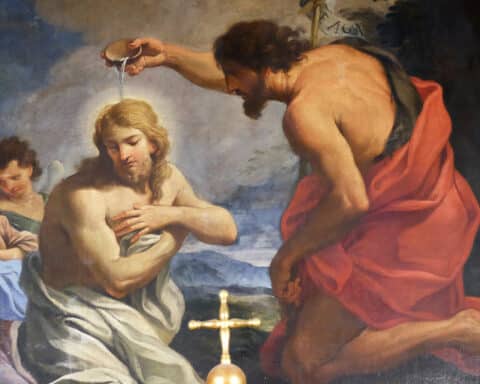
Yet Jesus answers John’s humility with a puzzling statement: “Allow it now, for thus it is fitting for us to fulfill all righteousness” (Mt 3:15). What does Jesus mean by this perplexing claim? How is his baptism about righteousness?
Righteousness, in the New Testament, relates to a proper relation or posture before God. The righteous one is full of virtue, pure of heart, seeking obedience to the will of God alone. It is the righteous servant in Isaiah who will bring justice to the nations.
What does it mean for Jesus to be righteous? Surely, the Word made flesh, the splendor of the Father, was not born in a state of sin. Is he not, by his very being, righteous?
The righteousness of Jesus’ baptism is revealed in the manifestation that takes place as he descends into the waters. The Spirit of God falls upon Jesus, and a voice announces that Jesus is the beloved son, who is well-pleasing to the Father (Mt 3:17).
| Jan. 12 — The Feast of the Baptism of the Lord |
|---|
|
Is 42:1-4, 6-7
Ps 29:1-2, 3-4, 3, 9-10
Acts 10:34-38
Mt 3:13-17
|
The proclamation of Jesus’ belovedness is a reference to Psalm 2. This psalm begins with an incredulous query, demanding to know why the kings of the earth conspire against the Lord. The Lord has no fear of the duplicities of these faux kings, for God has set up a true king on Mount Zion. This king is the Lord’s own beloved son, and he will live out this sonship through taking refuge in God alone.
The great king will not depend on his own power, setting up a rival kingdom to the God of Abraham, of Isaac and of Jacob. His kingdom will be the kingdom of the Father.
At last, we have a rationale for Jesus’ baptism. He is the most beloved of sons, the very Word of the Father. The kingdom of God he comes to inaugurate is not his own. Baptism is righteous for Jesus not because he’s a sinner, but because he’s the Son of the Father, the beloved son.
His sonship, though, is not simply divine. Jesus is also a son of Israel. In receiving John’s baptism, Jesus takes on all the sin of Israel, its story of redemption as his own. He has not come to introduce a redemption apart from what the prophets promised and hoped for. He is the one, the righteous servant from Isaiah who will establish justice in this sin-sick world.
In this sense, the baptism of Jesus continues the themes of Christmas. Divine sonship is not revealed in Matthew through a blinding glory. It is even unclear in Matthew whether the words announced by the Father are heard by the crowds.
As Jesus begins his ministry, what everyone sees is the son of Mary and Joseph receiving a baptism for the forgiveness of sins. His divine mission is hidden, not even fully known by John the Baptist.
In the end, is this not what divine sonship is about? It’s not about power, a glorious recognition of one’s identity. It’s about obediential love — a love that will love unto the end.
The gift of Jesus’ incarnation is that each of us is invited to share in this sonship of Jesus Christ. We may be made righteous through our baptism into Our Lord.
We have become, through Jesus, beloved sons and daughters of the Father.
Because the Word made flesh is pleasing to the Father, so are we.
Timothy P. O’Malley, Ph.D., is the director of education at the McGrath Institute for Church Life at the University of Notre Dame.





